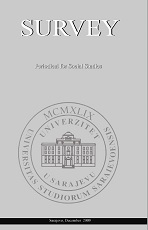Contemporary Populist Political Culture: From Modernism to Postmodernist Political Trends
Contemporary Populist Political Culture: From Modernism to Postmodernist Political Trends
Author(s): Tatjana LazićSubject(s): Politics / Political Sciences
Published by: Univerzitet u Sarajevu
Keywords: populism; political culture; political parties; democracy; media
Summary/Abstract: The author analyses the degree of influence populism has on main political trends in Euro-Atlantic societies by examining problems surrounding the terminological conceptualization of populism and its historicalmanifestations in a specific national context. The interiorization of populism into the liberal-democratic political discourse has been made possible by the ambivalent nature of democratic political culture, which implies not only the autonomy of thought and the participation of citizens in the political system, but also certain loyalistic, subservient elements, cognitive-affective unity and the consent of subjects on fundamental values on which a political order is based.At times ofmajor social crises, which problematize and reevaluate the overall value system, populism, through the programs of the far right and left, skillfully utilizes the indoctrinational potential of democracy offering a simplified explication of the reasons that caused crises and by influencing the retraditionalization of behavior imposes itself as the guardian of a national collective’s values and tradition. Populism, by instrumentalizing mass media, interprets politics into a simple and easily understandable language thus reducing the need for an intellectual and critical potential.
Journal: SURVEY - Periodical for Social Studies
- Issue Year: 2009
- Issue No: 1
- Page Range: 71-93
- Page Count: 23
- Language: English

